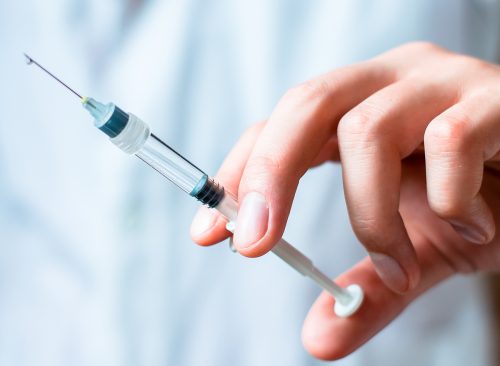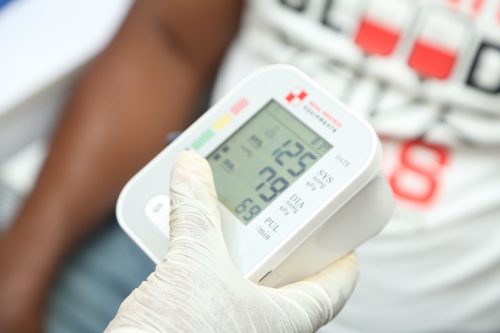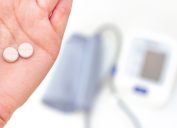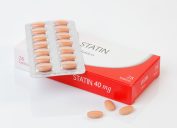New Single Shot Shown to Slash High Blood Pressure for 6 Months, Researchers Say
Patients receiving treatment saw significant reductions in blood pressure measurements.

According to the Centers for Disease Control and Prevention (CDC), having high blood pressure, also known as hypertension, puts you at risk for both heart disease and stroke: the two leading causes of death in the U.S. With that in mind—and with nearly half of Americans diagnosed with hypertension—researchers are regularly looking for more effective ways to keep the condition under control. Lifestyle changes can be key to doing so, but doctors sometimes also recommend medication to treat high blood pressure. And now, there's a new treatment, a shot called zilebesiran, that seems to yield impressive results after just one dose. Read on to discover more about the latest findings.
RELATED: Brand New Drug Reverses Obesity With No Real Side Effects, Researchers Say.
Researchers evaluated almost 400 patients with high blood pressure.

Results from the phase 2 KARDIA-1 trial of the experimental medication zilebesiran were announced on Saturday at the American Heart Association's (AHA) Scientific Sessions 2023 meeting in Philadelphia.
According to a press release summarizing findings, researchers evaluated 394 patients with an average age of 57 and an average systolic blood pressure of 142 mmHg. (According to the CDC, hypertension is defined as systolic blood pressure greater than 130 mmHg.) A total of 377 patients were included in analyses.
Participants were randomly assigned to a placebo group or one of four zilebesiran treatment groups: 150, 300, or 600 milligrams once every six months, or 300 milligrams once every three months.
RELATED: Common Statin Spikes Diabetes Risk, New Study Finds.
Zilebesiran showed promising results.

Researchers found that a single shot of zilebesiran was both safe and effective in lowering blood pressure in adults with mild-to-moderate hypertension for six months.
Patients who received a single dose of zilebesiran had, on average, greater than 10 mmHg reductions in 24-hour systolic blood pressure, when compared with those who received a placebo. According to the Cleveland Clinic, 24-hour ambulatory blood pressure monitoring is taken on a continuous basis for 24 hours.
When evaluating patients at the three-month follow-up, those who received the 300 or 600-milligram dose of zilebesiran had blood pressure lowered by 15 mmHg or more on average. After six months, those who received zilebesiran "were significantly more likely" to experience reductions of 20 mmHg or more without having to take additional medications. Also at this point, patients who received zilebesiran were more likely to achieve 24-hour systolic blood pressure measurements of 130 mmHg or less.
"Our study demonstrates that either quarterly or biannual doses of zilebesiran can effectively and safely lower blood pressure in patients with uncontrolled hypertension," lead study author George L. Bakris, MD, FAHA, professor of medicine and director of the Comprehensive Hypertension Center at the University of Chicago Medicine, said in the AHA press release.
He continued, "It is well known that reductions in systolic blood pressure of greater than or equal to 5 mm Hg are linked to a reduction in cardiovascular risk. These results reinforce the potential of zilebesiran to provide sustained blood pressure control, improve adherence to medication via infrequent dosing, and in turn, improve outcomes for people with high blood pressure."
RELATED: This Daily Walking Plan Might Be All the Cardio You Need, New Study Shows.
Patients on zilebesiran experienced additional benefits and limited side effects.

In addition to these improvements and greater reductions in daytime and nighttime systolic blood pressure, those receiving zilebesiran also had 90 percent reductions in serum levels of angiotensinogen (AGT). According to the press release, AGT is a hormone that is mostly produced in the liver and plays a role in blood pressure regulation.
Researchers also noted low rates of adverse events related to zilebesiran, with the most common side effect being reactions at the shot injection site. Bakris added that researchers didn't observe any "clinically relevant changes in kidney or liver function."
Four participants did discontinue zilebesiran use due to "non-serious" adverse events, researchers noted, including two who reported orthostatic hypotension (low blood pressure that occurs when sitting or lying down), one with blood pressure elevation, and one with an injection site reaction. No adverse reactions were reported in the placebo group.
More research is necessary.

There were some limitations to the study cited in the press release, including the fact that only people with mild-to-moderate hypertension were evaluated.
In addition, results were limited to the six-month placebo-controlled period, with researchers noting that more studies are required to address longer-term safety and impacts.
RELATED: For more up-to-date information, sign up for our daily newsletter.
Best Life offers the most up-to-date information from top experts, new research, and health agencies, but our content is not meant to be a substitute for professional guidance. When it comes to the medication you're taking or any other health questions you have, always consult your healthcare provider directly.





















